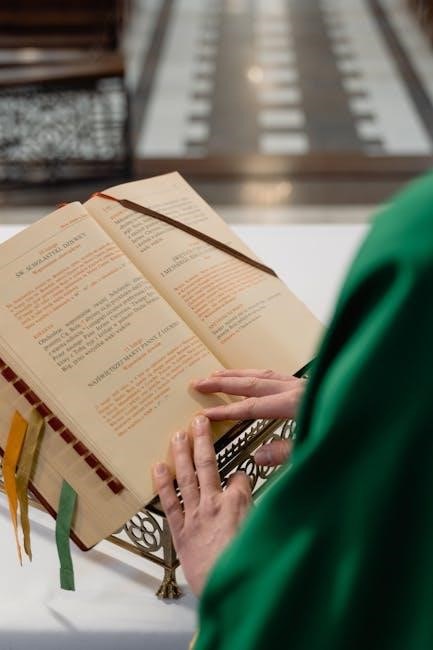The Book of Ruth is a timeless narrative of faith‚ loyalty‚ and redemption‚ offering insights into God’s grace across cultures and generations‚ connecting to the Savior’s lineage.
1.1 Overview of the Book of Ruth
The Book of Ruth is a four-chapter narrative that explores themes of loyalty‚ redemption‚ and divine grace. Set during the time of the judges‚ it tells the story of Ruth‚ a Moabite woman‚ and her journey with her mother-in-law Naomi. The story begins with hardship in Bethlehem‚ leading the family to Moab‚ where tragedy strikes. Ruth’s devotion to Naomi and her faith in the God of Israel are central to the narrative. Her encounter with Boaz‚ a distant relative‚ leads to redemption and ultimately ties her lineage to King David. This book highlights God’s providence and inclusive love across cultures.
1.2 Importance of Studying Ruth in a Bible Study Context
Studying the Book of Ruth is vital for understanding God’s grace and redemption across cultures. Its narrative resonates with multicultural and multilingual communities‚ illustrating faith‚ loyalty‚ and divine providence. Ruth’s journey reflects God’s inclusive love‚ transcending ethnic boundaries‚ making it a powerful tool for unity. The story’s themes of perseverance and trust in God offer practical life lessons‚ encouraging believers to apply biblical principles in modern contexts. Additionally‚ Ruth’s genealogical tie to King David highlights its significance in the broader biblical narrative‚ emphasizing God’s plan of salvation and grace for all people.
1.3 Historical and Cultural Significance of the Book of Ruth
The Book of Ruth holds profound historical and cultural significance as it bridges the era of Judges and the monarchy in Israel. Set during a time of famine and societal instability‚ it highlights themes of survival‚ resilience‚ and divine faithfulness. Culturally‚ Ruth‚ a Moabite‚ challenges Israelite prejudices‚ demonstrating God’s grace beyond ethnic boundaries. Her integration into Israelite society and eventual inclusion in the Davidic lineage underscore God’s redemptive plan. This narrative not only reflects the complexities of ancient Near Eastern culture but also serves as a testament to God’s impartial love‚ making it a cornerstone of biblical theology and cross-cultural unity.

Key Themes in the Book of Ruth
The Book of Ruth explores themes of faith‚ loyalty‚ and redemption‚ emphasizing God’s grace and providence. It highlights the importance of family‚ cultural inclusion‚ and divine sovereignty in shaping lives.
2.1 Faith and Loyalty in the Story of Ruth
Ruth’s story is a profound example of unwavering faith and loyalty. Despite suffering loss and uncertainty‚ Ruth remains devoted to Naomi‚ embodying covenantal faith. Her declaration in Ruth 1:16-17 reflects her commitment to both Naomi and the God of Israel. Ruth’s faith is demonstrated through her trust in God’s providence‚ even in difficult circumstances. Similarly‚ Boaz’s kindness and integrity highlight his faith and loyalty to God’s laws. Together‚ their actions illustrate how faith and loyalty lead to redemption and blessings‚ serving as a testament to God’s faithfulness in the lives of His people.
2.2 Redemption and Grace in the Book of Ruth
The Book of Ruth beautifully illustrates God’s redemption and grace. Ruth‚ a Moabite widow‚ finds favor with Boaz‚ a kinsman-redeemer‚ who symbolizes God’s redemptive plan. Through Ruth’s journey‚ we see how God extends grace to those outside the covenant‚ highlighting His universal love. Boaz’s actions demonstrate redemption‚ purchasing Naomi’s land and marrying Ruth‚ restoring her family’s legacy. This redemption points to Christ‚ the ultimate Redeemer‚ who brings salvation to all. The story shows how God works through ordinary lives to fulfill His divine plan‚ offering hope and restoration to the marginalized and oppressed.
2.3 The Role of Women in the Book of Ruth
The Book of Ruth highlights the significant roles of women in shaping the narrative. Ruth‚ a Moabite widow‚ exemplifies loyalty‚ courage‚ and faith as she commits to Naomi and her God. Naomi‚ though grief-stricken‚ guides Ruth in navigating cultural and societal challenges. Both women challenge patriarchal norms‚ demonstrating strength and resilience. Their relationship reflects mutual support and trust‚ showing how women can lead and inspire within their communities. The story underscores God’s inclusive grace‚ as Ruth‚ a foreigner‚ becomes part of the lineage of King David‚ illustrating the transformative power of faith and the value of women in God’s plan.

Historical Context of the Book of Ruth
The Book of Ruth is set during the time of the judges in Israel‚ a period marked by leadership challenges and cultural transitions‚ reflecting ancient Near Eastern dynamics.
3.1 The Setting of the Book of Ruth in Ancient Israel
The Book of Ruth is set during the time of the judges in Israel‚ a period characterized by a lack of centralized leadership and frequent foreign invasions. The story begins in Bethlehem‚ a town in the tribe of Judah‚ which was known as the “house of bread” but was experiencing a severe famine. This setting highlights the economic and social challenges faced by the Israelites‚ providing a backdrop for the narrative of Naomi and Ruth’s journey. The events unfold against the broader context of ancient Near Eastern culture and traditions.
3.2 The Relationship Between Israelites and Moabites
The relationship between Israelites and Moabites was historically tense‚ rooted in centuries of conflict and cultural differences. Moabites were often viewed with suspicion due to their idolatrous practices and opposition to Israel during their wilderness journey. The Torah prohibited Moabites from entering the Israelite congregation‚ yet Ruth‚ a Moabitess‚ broke this barrier through her marriage to Mahlon and her loyalty to Naomi. Her story highlights God’s grace in transcending ethnic divisions‚ showing that faith and devotion could bridge even the deepest cultural and historical rifts between Israelites and Moabites.
3;3 The Role of the Judges in the Time of Ruth
The Book of Ruth is set during the era of the Judges‚ a period marked by chaos and lack of centralized leadership in Israel. Judges served as deliverers‚ providing guidance and justice in times of crisis. However‚ their role was often reactive‚ addressing specific threats rather than governing comprehensively. The story of Ruth reflects this backdrop‚ as the absence of a strong judicial system allowed for informal arrangements‚ such as Boaz’s role in redeeming Naomi’s family. This highlights God’s providence even amidst societal instability‚ showing how His plan unfolded through ordinary lives during a tumultuous time in Israel’s history.

Weekly Bible Study Lessons on Ruth
This five-week study explores Ruth’s journey‚ from her relationship with Naomi to the redemption of her family‚ offering insights into faith‚ grace‚ and cultural diversity‚ inspiring spiritual growth and practical application in daily life.
Week 1 explores Ruth 1‚ introducing the journey of Naomi and Ruth amid famine‚ loss‚ and cultural challenges. The study begins with Naomi’s move to Moab‚ the tragic events that befell her family‚ and her return to Bethlehem with Ruth. Discussion questions focus on the decision to move‚ its consequences‚ and the theme of obedience. The memory verse‚ “to give them beauty for ashes‚” highlights God’s redemption in their story‚ setting the stage for understanding His grace in difficult circumstances and the cultural dynamics between Israelites and Moabites.
4.2 Week 2: Ruth’s Encounter with Boaz (Ruth 2)
Week 2 focuses on Ruth 2‚ detailing Ruth’s encounter with Boaz while gleaning in his fields. This chapter highlights Boaz’s kindness and Ruth’s diligence‚ showcasing divine providence. Discussion topics include Boaz’s character‚ Ruth’s humility‚ and the biblical theme of grace. Reflection questions explore how God’s favor is evident in their interaction‚ emphasizing obedience in everyday life. The study also examines cultural norms and the significance of gleaning‚ illustrating God’s care for the vulnerable and setting the stage for redemption in subsequent chapters.
4.3 Week 3: The Redemption of Naomi’s Family (Ruth 3-4)
Week 3 explores Ruth 3-4‚ detailing Naomi’s strategic plan for Ruth to approach Boaz‚ leading to the redemption of her family. Boaz’s integrity shines as he legally redeems Naomi’s land and marries Ruth‚ embodying divine grace. Discussion questions focus on the legal customs of redemption‚ Boaz’s role as a kinsman-redeemer‚ and the theological significance of Ruth’s inclusion in Israel’s lineage. Reflections emphasize God’s providence in transforming sorrow into joy and His faithfulness in fulfilling His covenant promises. This week’s study highlights the importance of obedience and trust in God’s plan‚ culminating in the lineage of King David.
4.4 Week 4: The Genealogy of King David and Its Significance
Week 4 examines Ruth 4:14-15 and the genealogy linking Ruth to King David‚ highlighting God’s redemptive plan. Ruth‚ a Moabite‚ becomes part of Israel’s royal lineage‚ showcasing divine grace. This section reveals how God weaves unlikely individuals into His covenant promises‚ emphasizing His sovereignty. Discussion questions explore the theological significance of Ruth’s inclusion and its reflection of God’s universal redemption. Reflections focus on how Ruth’s story points to Christ‚ the ultimate redeemer‚ and the unity of Jews and Gentiles in Him. This week underscores God’s faithfulness in fulfilling His promises across generations.
4.5 Week 5: Applying the Lessons of Ruth to Modern Life
Week 5 focuses on applying Ruth’s lessons to modern life‚ emphasizing faith‚ loyalty‚ and God’s grace. Participants reflect on how Ruth’s journey inspires trust in God’s plan amidst challenges. Discussions explore themes like kindness‚ community‚ and cross-cultural unity‚ encouraging believers to embody these values. Practical applications include serving others‚ fostering inclusivity‚ and trusting God’s sovereignty in everyday life. This week culminates in a deeper understanding of how Ruth’s story transcends time‚ offering timeless wisdom for believers today to live faithfully and compassionately in their own contexts.

Practical Application of the Book of Ruth
Apply Ruth’s lessons by embracing faith‚ loyalty‚ and compassion in daily life‚ fostering community‚ and trusting God’s sovereignty in challenging circumstances‚ reflecting her transformative journey.
5.1 Discussion Questions for Each Chapter of Ruth
Engage deeply with each chapter through reflective questions. For Ruth 1‚ explore Naomi’s emotional journey and the decision to return to Bethlehem. In Ruth 2‚ discuss Boaz’s kindness and Ruth’s diligence. Chapter 3 invites reflection on Naomi’s guidance and Ruth’s courage. Ruth 4 highlights the redemption process and its significance. These questions encourage personal connection and application of biblical principles to modern life‚ fostering spiritual growth and community discussion.
5.2 How to Use the Book of Ruth in Personal Devotions
Begin by reading a chapter of Ruth daily‚ reflecting on themes like loyalty and faith. Study the historical context to appreciate Ruth’s journey as a Moabite. Journal about relationships‚ such as Ruth and Naomi’s bond‚ and apply these lessons to your life. Pray for guidance in applying Ruth’s faith to your decisions. Meditate on key verses and seek ways to connect ancient stories to modern life. Use Bible study resources to deepen your understanding and engage actively with the text for spiritual growth and a closer relationship with God.
5.3 Group Study Ideas for a Ruth Bible Study
Engage your group with weekly discussions on key themes like faith‚ redemption‚ and cultural diversity. Use role-playing to recreate scenes from Ruth’s story‚ fostering deeper connection. Include reflection exercises where members share personal insights or struggles‚ linking them to the text. Incorporate cultural context discussions to explore Ruth’s Moabite heritage and its significance. Plan service projects inspired by Ruth’s loyalty‚ such as helping widows or the needy. Encourage members to share how Ruth’s story impacts their faith journey‚ creating a supportive and transformative learning environment.
The Book of Ruth beautifully illustrates God’s grace‚ redemption‚ and faithfulness‚ offering timeless lessons for personal growth and community transformation‚ inspiring deeper reflection and application in daily life.
6.1 Summary of Key Takeaways from the Book of Ruth
The Book of Ruth offers profound lessons on faith‚ loyalty‚ and redemption. Ruth’s journey from widowhood to becoming part of the Messiah’s lineage highlights God’s grace and providence. Her unwavering commitment to Naomi and her trust in God’s sovereignty serve as a model of faith. Boaz’s role as a redeemer exemplifies God’s plan of salvation and the importance of kindness. The story also underscores the value of cultural diversity‚ as Ruth‚ a Moabite‚ becomes integral to Israel’s history. Ultimately‚ the book teaches us to trust God in adversity‚ embrace community‚ and recognize His redemptive work in everyday life.
6.2 Encouragement for Further Study and Reflection
The Book of Ruth invites deeper reflection on God’s faithfulness and grace. Its themes of loyalty‚ redemption‚ and cultural diversity resonate universally‚ encouraging believers to trust God in adversity. Exploring Ruth’s journey can inspire personal devotion and group discussions‚ fostering spiritual growth. Embrace the opportunity to apply its lessons to modern life‚ finding hope in God’s providence. Let Ruth’s story motivate you to trust God’s plan‚ live with integrity‚ and embrace His redemptive love‚ transforming your life and community with His truth.
